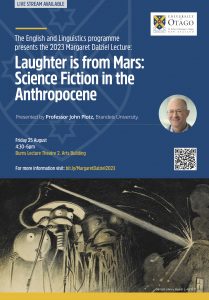 The Centre for the Book is pleased to share the news about this year’s Margaret Dalziel lecture, “Laughter is From Mars: Science Fiction in the Anthropocene,” which will be delivered by Professor John Plotz of Brandeis University on Friday August 25, 4:30-6:00, Lecture Theatre 2 in the Arts/Robert Burns Building on the University of Otago campus. Further details may be found here: https://www.otago.ac.nz/news/events/otago0243129.html
The Centre for the Book is pleased to share the news about this year’s Margaret Dalziel lecture, “Laughter is From Mars: Science Fiction in the Anthropocene,” which will be delivered by Professor John Plotz of Brandeis University on Friday August 25, 4:30-6:00, Lecture Theatre 2 in the Arts/Robert Burns Building on the University of Otago campus. Further details may be found here: https://www.otago.ac.nz/news/events/otago0243129.html
The lecture is free and open to the public, so please feel free to share the details with anyone who might like to attend. There will be a livestream for those who are unable to be with us in person:
https://www.otago.ac.nz/its/services/teaching/streaming/otago469606.html
“Laughter is From Mars: Science Fiction in the Anthropocene”
This talk proposes that we have underestimated science fiction’s capacity to represent and critique science and the technological power it wields. When Joseph Conrad called H G Wells the “realist of the fantastic” he set surprisingly durable terms for understanding science fiction’s relationship to actuality. Scholars have argued since about whether the genre principally extrapolates from the present, or speculates on what other economic/political/cultural configurations might be possible. This talk, by contrast, traces the genre’s long tradition of mocking human self-centredness.
Recentring our understanding of SF on satire may offer a way to reframe Amitav Ghosh’s notion of “the peculiar forms of resistance that climate change presents” to “serious” fiction. For many decades, science fiction’s satiric thrust was Menippean, oriented chiefly against an exaggerated sense of humankind’s importance (do you think the world revolves around you?). But the nature of that satire has changed as writers struggled with the fact that humans truly had a world-altering and world-destroying capacity. In the 20th century, the human capacity to destroy the world (atomically, mainly) was satirised by Capek, Lem, Vonnegut, Le Guin and others. This lecture, after tracing that legacy, assesses SF’s newfound capacity to satirize humanity’s present destructive power principally by way of N K Jemisin’s The Fifth Season, set in a world where people control and create earthquakes with their minds.

